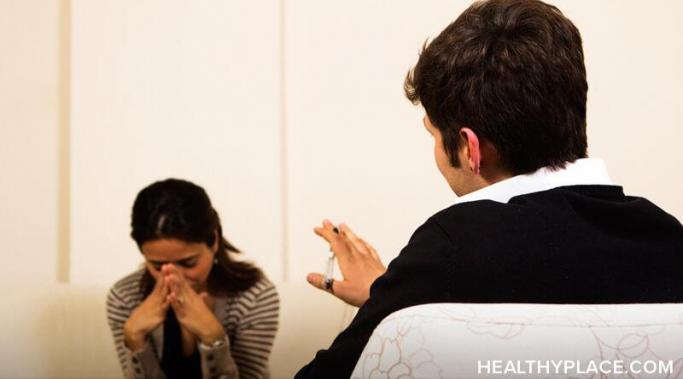Blogs
I binged; now what should I do? I recently slipped on my eating disorder recovery and binged. It's a difficult thing to admit to the world, but I did. It can be extremely hard to bounce back after a binge. It can feel like a total failure and like it's the end of the world. Guess what, it's not. Here I share the lessons I've learned from my recent binge.
Learning what borderline personality disorder (BPD) feels like can clear up the misunderstandings and stigma associated with BPD. While behaviors on the outside may be interpreted as malicious or manipulative, what's actually going on on the inside of someone who is struggling with this illness? I believe with understanding comes compassion. With the video below, my hope is to shed a little bit of light as to what borderline anxiety, shame, and anger feel like on the inside.
I hear voices because of my dissociative identity disorder (DID), but I'm not psychotic. Hearing voices is a symptom experienced by many people who have DID. These auditory hallucinations are not the same as those experienced in psychosis; they are internal rather than external. Hearing voices is a normal part of having DID, but is a misunderstood symptom.
Substitute addictions may become a problem when people who overcome one addiction turn to something else to fill the void. Addiction is a difficult thing to conquer, and when people have to learn to live and cope without the drugs or alcohol they have been using as a coping mechanism, they sometimes fall victim to another addiction in the process. A drinker becomes addicted to benzodiazepines. A meth addict becomes an over-eater. A heroin addict becomes an alcoholic. Substitute addictions are challenging and frustrating for friends and family to deal with, and the people who are addicted may not even recognize that they are substituting one addiction for another.
Is this hypomania or happiness? I’m afraid to be happy. I know that’s a cliché, but, for me, it’s true. I’m afraid to be happy because happiness can betray me. What if it just turns out to be schizoaffective hypomania and I crash into a depression? Hypomania vs. happiness really matters.
We should celebrate achievements when we're depressed because it's a wonderful way to bring positivity into our lives. When we are depressed, just getting through a day without falling part can be difficult. Many times, getting out of bed and showering requires great effort. Then, add in all of the other items on our to-do lists, and achieving anything feels nearly impossible. At times like these, it’s important to be gentle with ourselves and celebrate our achievements. I've thought about why this is important and how we can celebrate achievements when we're depressed.
You can use words as a tool to conquer anxiety by changing the anxiety words in your vocabulary. The saying is true: "The pen is mightier than the sword.” Fighting anxiety, struggling, and thrashing against it keeps your energy and focus on anxiety. But how can you replace fighting -- with your words. Specifically, change the anxiety words in your vocabulary. Changing how you think will change how you act, how you are, and how you live.
You can avoid the self-esteem traps that create unrealistic self-importance instead of healthy self-esteem. You should continue to build yourself up despite possible self-esteem traps because living with low self-esteem has many negative consequences as well. Low self-esteem can make you unwilling and unmotivated to achieve what you are capable of, averse to relationships that you deserve, and it can make you vulnerable to depression.1 In order to protect yourself, it is, therefore, vital to build your self-esteem. However, there are ways that build self-esteem that can end up fostering other negative outcomes in your life, or self-esteem traps. If you want to maximize your wellbeing and have more positive interactions with people, then it pays to be mindful of the self-esteem traps of narcissism, jealousy and resentment.
Questions about self-harm scars and dating, sex and intimacy cause many people with visible self-harm scars to worry: "Are self-harm scars a turn-off?" "Should I try to hide my scars from my partner?" "When is it appropriate to explain my scars to a partner, and how can I best approach this type of conversation?" What are the right answers to these questions about self-harm scars and dating?
Do you ever feel like you're in a mental fog, you can't think straight, or as though you have to labor to access even the simplest thoughts? I feel this way often, and it used to make me panic, like I was losing my mental faculties. Then I realized that "mental fog," aka "brain fog," (not clinical terms) or confusion can actually result from posttraumatic stress disorder (PTSD). Triggers, stress, and anxiety can heighten feelings of mental fog--leaving those of us with PTSD feeling even more vulnerable and confused during the very moments when we most need to feel safe and in control.










I believe she will only be able to rid herself of her demons, and hopefully her BPD as well, when she's ready to confront the abuse of her father. If she can put the blame where it belongs, she may stop projecting that victim/perpetrator cycle on the present men in her life. These demons are a metaphor for the purgatory she has created for herself. That reality has consequences in the real world, but it need not be real in the tangible sense. Exorcising her demons will require the expenditure of real physical energy and probably the destruction of aspects of her personality. If this ever happens, and it's possible but not probable, then these demons will evaporate. They are only as real as one's personality is real. In short, reality is not the question, it's what you make of the things you feel to be real.